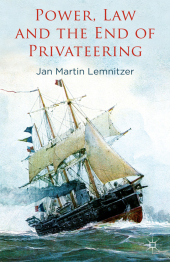 Neuerscheinungen 2014Stand: 2020-02-01 |
Schnellsuche
ISBN/Stichwort/Autor
|
Herderstraße 10
10625 Berlin
Tel.: 030 315 714 16
Fax 030 315 714 14
info@buchspektrum.de |

J. Lemnitzer
Power, Law and the End of Privateering
1st ed. 2014. 2014. xii, 254 S. 216 mm
Verlag/Jahr: SPRINGER PALGRAVE MACMILLAN; PALGRAVE MACMILLAN UK 2014
ISBN: 1-349-33738-2 (1349337382)
Neue ISBN: 978-1-349-33738-5 (9781349337385)
Preis und Lieferzeit: Bitte klicken
This book offers an exciting new take on the relationship between law and power. The 1856 Declaration of Paris marks the precise moment when international law became universal, and was an aggressive and successful British move to end privateering forever - then the United States´ main weapon in case of war with Britain.
Introduction: Power, Law and the Declaration of Paris 1. ´More serious than the Eastern question itself´ - The Crimean War Compromise 2. The Crimean War and Maritime Law 3. ´Catching Brother Jonathan in the trap which he laid for us´ - The Genesis of the Declaration of Paris 4. ´That moral league of nations against the United States´ - The Declaration of Paris and the Marcy Amendment 5. ´The United States have a vote in framing the maritime law of this age´ - The Cass Memorandum and Bremen´s Campaign for the Marcy Amendment 6. The Declaration of Paris and the American Civil War 7. ´Announcing our withdrawal from the Declaration´ - The Declaration of Paris and the Franco-German War of 1870 Conclusion: The Rise and Fall of the Declaration of Paris
"Jan Lemnitzer has awakened the 1856 Declaration of Paris from a very long sleep, and what an awakening it is! The Declaration of Paris, issued at the end of the Crimean War, is the grandfather of all modern international law agreements on the conduct of war, and it had a direct influence on both the US Navy´s blockade of the Confederate States in the American Civil War and the attempted blockades of the Franco-Prussian War. It is a story of diplomats and captains, of lawyers and judges, and all with the threat of the most dire international conflicts hanging behind them. Here is a vast contribution to the American Civil War, European diplomatic history, and the laws of nations." - Professor Allen Carl Guelzo, Gettysburg College, USA, New York Times best-selling
author of Gettysburg: The Last Invasion
"Jan Martin Lemnitzer reveals the forgotten origins of the modern law of the sea and shows that the 19th century´s efforts to regulate naval warfare explain a great deal about the course of the First World War." - Professor Nicholas Rodger, All Souls College, Oxford, UK
"Lemnitzer´s diplomatic history of the circumstances and negotiations around the international agreement transforming belligerent law at sea, the Declaration of Paris of 1856, is both thoroughly well researched in all the appropriate archives and so well written that it is a pleasure to read. ... his book is a must for any student of belligerent law, international law in general, and nineteenth-century diplomatic history." - Nicholas Tracy, University of New Brunswick, Canada
"[T]horoughly well researched in all the appropriate archives and so well written that it is a pleasure to read. ... his book is a must for any student of belligerent law, international law in general, and nineteenth-century diplomatic history." - International Journal of Maritime History
"...path-breaking" - Professor Antony Howe, University of East Anglia, UK
"Jan Martin Lemnitzer has made a very important contribution to international history in this study of the 1856 Declaration of Paris and its immediate aftermath. ... With a highly structured approach and a persuasively presented argument, Lemnitzer has made excellent use of primary-source materials from Austria, Britain, France, Germany, and the United States. He has brought to light much new and detailed material, which he complements with broad-gauged and valuable insight." - Professor John B. Hattendorf, Naval War College, USA
´In this excellent monograph, Jan Martin Lemnitzer offers a study of the first global norms of maritime war, created in the mid-nineteenth century.´ - Dirk Bonker, Duke University, American Historical Review


